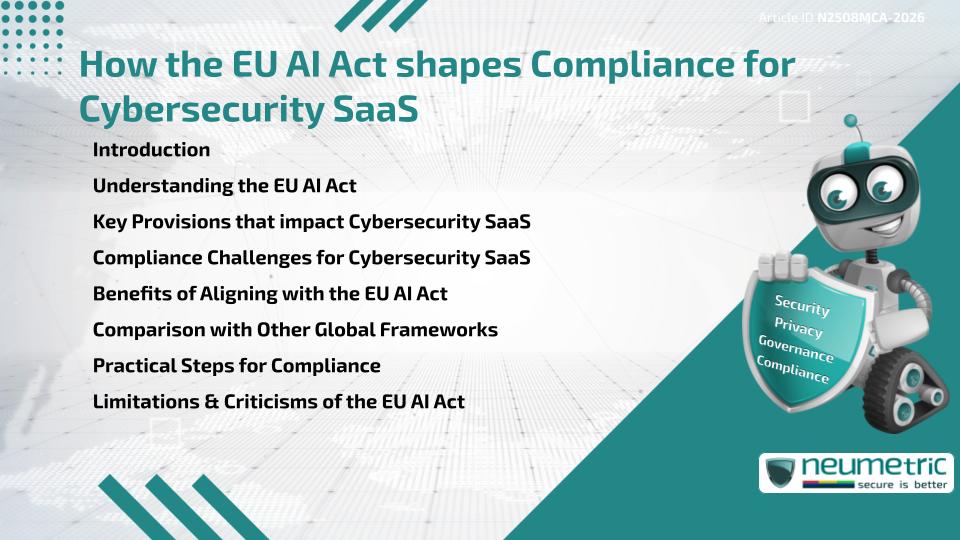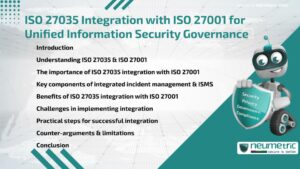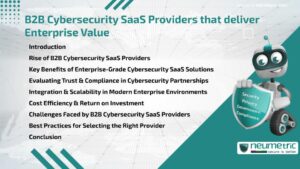Table of Contents
ToggleIntroduction
The EU AI Act is the first comprehensive Legal Framework in the world regulating Artificial Intelligence. For Cybersecurity Software-as-a-Service [SaaS] Providers, this Act is a turning point. It introduces Risk-based rules for AI Systems, requires stronger Accountability & aligns AI Development with Ethical & Legal standards. Cybersecurity SaaS Providers must now evaluate whether their products use AI in ways that fall under High-Risk categories, adjust Compliance strategies & integrate safeguards into their Operations. Understanding how the EU AI Act applies to Cybersecurity SaaS is crucial for Legal Compliance, Customer Trust & Market competitiveness.
Understanding the EU AI Act
The EU AI Act was adopted to address concerns over AI Safety, Fairness & Human Rights. It classifies AI applications into categories ranging from minimal Risk to unacceptable Risk. While some Tools, like Spam Filters, are seen as low Risk, AI Applications in critical infrastructure or decision-making are high Risk. Cybersecurity SaaS Providers that use AI for Threat detection, Anomaly analysis or Automated decision-making often fall into the High-Risk category.
Key Provisions that impact Cybersecurity SaaS
The Act imposes obligations on Providers of High-Risk AI Systems, including:
- Transparent documentation about how AI works.
- Robust Risk Management & Data Governance.
- Human oversight for critical AI-driven decisions.
- Mandatory post-market monitoring.
For Cybersecurity SaaS, this means re-evaluating how their Platforms collect & process data, ensuring explainability of Detection Models & integrating mechanisms for Human validation before automated enforcement.
Compliance Challenges for Cybersecurity SaaS
Compliance is not straightforward. SaaS Companies must manage:
- Ambiguity in defining whether specific AI applications fall under High-Risk.
- Increased costs for Compliance, including Audits & Certification.
- Balancing Transparency with the need to protect sensitive security methods.
One analogy is like walking a tightrope: Providers must reveal enough about their AI Models to meet Transparency requirements, but not so much that Malicious Actors can exploit System Vulnerabilities.
Benefits of Aligning with the EU AI Act
While Compliance can seem burdensome, it offers advantages:
- Enhanced trust from Customers who value Transparency.
- A competitive edge in Regulated markets such as the European Union.
- Streamlined processes that reduce Bias & Error in AI-driven Security Measures.
By aligning with the Act, SaaS Providers strengthen both their Legal standing & their Reputation.
Comparison with Other Global Frameworks
The EU AI Act is often compared with frameworks like the General Data Protection Regulation [GDPR], as both set Global benchmarks. Unlike GDPR, which addresses Personal Data, the EU AI Act focuses on AI functionality. Other regions, such as the United States, take a more sector-specific & voluntary approach. This means SaaS Companies working internationally must juggle multiple Compliance frameworks.
Practical Steps for Compliance
To prepare, Cybersecurity SaaS Providers should:
- Conduct AI System Audits to identify Risk levels.
- Implement explainability Tools for Customers.
- Establish oversight committees for High-Risk AI Operations.
- Train Staff on Compliance obligations.
- Document AI lifecycle management, from development to deployment.
This roadmap not only meets legal obligations but also embeds Compliance into daily operations.
Limitations & Criticisms of the EU AI Act
Critics argue that the Act may slow down innovation due to Compliance Costs. Others worry about inconsistent interpretations across EU member states. There is also concern that smaller SaaS Providers may struggle more than larger Enterprises with Compliance expenses. Still, the Act remains a significant milestone in regulating AI use responsibly.
Takeaways
- The EU AI Act introduces a Risk-based Framework that directly affects AI-driven Cybersecurity SaaS.
- High-Risk AI Systems must meet Transparency, Oversight & Accountability requirements.
- Compliance challenges include defining Risk Categories, balancing Transparency with Security & managing Costs.
- Early Compliance offers advantages such as stronger Customer Trust & Competitive positioning.
- Smaller SaaS Providers may face more difficulty than larger Enterprises in adapting to the Act.
FAQ
What is the main purpose of the EU AI Act?
The Act aims to regulate Artificial Intelligence by ensuring its Safety, Transparency & Compliance with Human Rights within the European Union.
How does the EU AI Act classify AI Systems?
It divides AI into Minimal Risk, Limited Risk, High Risk & Unacceptable Risk categories, with stricter rules for High-Risk Applications.
Why is the EU AI Act important for Cybersecurity SaaS?
Because many SaaS Tools use AI for Threat detection & monitoring, they may be categorised as High Risk, making Compliance mandatory.
Does the EU AI Act apply outside the European Union?
Yes. Any Company offering AI-based Services to EU Customers must comply, regardless of where the Provider is based.
How can Cybersecurity SaaS Providers ensure Compliance?
By Auditing their AI Systems, providing Transparency, ensuring Human oversight & documenting Risk Management processes.
What challenges do Providers face under the EU AI Act?
Challenges include Compliance Costs, defining High-risk Categories & balancing Security with Transparency.
Need help for Security, Privacy, Governance & VAPT?
Neumetric provides organisations the necessary help to achieve their Cybersecurity, Compliance, Governance, Privacy, Certifications & Pentesting needs.
Organisations & Businesses, specifically those which provide SaaS & AI Solutions in the Fintech, BFSI & other regulated sectors, usually need a Cybersecurity Partner for meeting & maintaining the ongoing Security & Privacy needs & requirements of their Enterprise Clients & Privacy conscious Customers.
SOC 2, ISO 27001, ISO 42001, NIST, HIPAA, HECVAT, EU GDPR are some of the Frameworks that are served by Fusion – a SaaS, multimodular, multitenant, centralised, automated, Cybersecurity & Compliance Management system.
Neumetric also provides Expert Services for technical security which covers VAPT for Web Applications, APIs, iOS & Android Mobile Apps, Security Testing for AWS & other Cloud Environments & Cloud Infrastructure & other similar scopes.
Reach out to us by Email or filling out the Contact Form…





